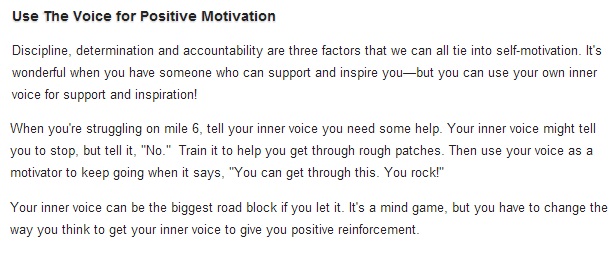“Workouts are like brushing my teeth; I don’t think about them, I just do them. The decision has already been made.” – Patti Sue Plumer
If you’re looking for the ultimate training “secret” then you’ve found it: consistency.
2013 is the Year of Consistency and we’ve plowed through over two weeks of material to help make running a more ingrained habit in your life.
We’ve seen how the Try Everything, Try Nothing Approach can sabotage your efforts to improve, while making it nearly impossible to get into the groove of running well.
I’ve given you the Plan B Technique to help you feel stronger and more empowered – even on days when you’re not feeling well. Turning a bad workout into a good performance helps reinforce the reasons why you run, so you can keep coming back for more.
Finally, we saw how Joe improved his marathon by over 66 minutes. He “stopped thinking and started training” by focusing his efforts on consistency and a smart plan instead of always jumping to the next best training tip.
All of these articles have reinforced that consistency is king. It’s the secret sauce of good training and if you don’t have it, you suffer the consequences. I hear about this constantly and it breaks my heart. See for yourself:
I’m able to maintain the schedule for awhile but then go through a phase of laziness and low motivation.
I love running so much that I’m inconsistent with strength work, so now I’ve been injured for all of 2013.
I need to be able to motivate myself back into consistency, but I always do too much, too soon.
Today, let’s discuss the most effective way of being more consistent: make running a habit sticks.
What Passes for Habit Change Advice
Much to my dismay, there’s too much woo-woo, feel good psycho-babble out there about how to build habits. And it just doesn’t help you change your existing habits or start a new one.
If you find it damn near impossible to run after a tough day at the office, will “trying harder” be successful for you? Hell no.
So I’m livid when I read stuff like this:
 Or this:
Or this:

Alas, it is. In a world where this is the conventional advice, most runners are left in the dark about how to really create change. If you want to make running a habit that you “just do,” instead of something you’re constantly planning to do, you’re out of luck.
Has this ever happened to you: when your alarm clock goes off, you think Oh it’s too dark and cold, I’ll just go later. Then you never run!
It’s so common – because mainstream habit change advice is terrible. You’ll see that “experts” are telling you to change who you are, like become a morning person. But if that’s not your normal energy pattern, it’s far too difficult to change.
Or my favorite: get a trainer that costs $100 per session. At an “optimal” schedule of three times per week, you’re spending $300 every week to work out!
Consistent Running with “Systems”
“We are what we repeatedly do. Excellence, therefore, is not an act but a habit” – Aristotle
When I first started running, every day we’d meet after school for cross country practice. It was a chore – I used to just play video games or hang out with my friends. Learning to run (every day!) after school was a new routine that took a lot of time to learn.
It was hard at first, like any new habit. I’ll be honest and admit I skipped a few practices.
But soon, everything clicked: I felt empowered after my daily run and saw my hard work paying off. I felt even more accomplished after a good race – running simply made me happy.
Maybe that sounds familiar. You might feel the same way after a week or month of consistent running. It’s exciting when your running feels effortless, isn’t it?
That’s the power of developing the habit of consistent running.
And like any habit, it can be learned. It’s easier to get through the lows of training or bad weather when you have good systems.
A running system is a habit shortcut that holds you accountable and makes it easier to accomplish your goals:
- Join a supportive community of runners that encourages you to finish your workouts
- Post a public monthly training journal – so you can get yelled at if you’ve been a slacker
- Are you a morning person? Don’t put off your run until the afternoon (when you always skip it). Lay out your clothes the night before and put your running shoes on as soon as you get up
Systems are proactive – they’re set up before you go running to help you accomplish your workout. They anticipate barriers and methodically create a solution to them.
If you want to finally know what it’s like to feel like an accomplished, strong runner, I invite you to learn more about the Team Strength Running.
What Are Your Barriers?

You don’t need to spend hundreds – or thousands – of dollars on a trainer or the latest Garmin GPS watch with elevation capabilities. Many runners do and then find themselves in the same position two months later.
Instead, it’s more helpful to identify the specific barriers that prevent you from completing your workouts or running more consistently.
Do you use your busy schedule as an excuse to skip your runs?
Do you lack the motivation to just lace up your shoes and GO?
Are you struggling to run consistently in the colder temperatures?
Trying harder or “just saying no” to your inner negative voice won’t help. That’s how you lapse into old habits.
Identifying the specific barriers that prevent you from staying injury-free or consistent is the first step.
Once you have a list of barriers, it’s time to develop the systems you’ll use to overcome those barriers. They can be simple like, “run with a friend on my long run” (you won’t skip a long run if someone is depending on you to show up).
Or they might be more complex, like scheduling automatic reminders in your calendar on pre-determined dates. If you know you slack off four weeks into a training program, cut that habit loop with a persuasive calendar reminder.
These are just a tiny sample of the techniques I use with my runners to help them run more consistently. You can learn more about the team here.
Does that sound like something you might benefit from?
When Running is a Habit…
Imagine that it’s easy to motivate yourself to complete your regular strength workouts. Or that you don’t have to use your finite willpower to do your tempo runs.
The sense of achievement from being consistent is powerful and can make you feel successful. You’re deliberating completing something you set out to do.
Consistency makes you feel ready for your race. Your body feels better and you’re more confident.
The attitude shift from being consistent is exciting and can encourage you to keep going. It can even spill over into other areas of your life – like performing better at work or being a better role model for your kids.
These are the reasons why 2013 is the Year of Consistency.
And it’s why hundreds of runners have joined the Team Strength Running. To make consistent running that feel-good thing you “just do,” instead of something you always try to do.